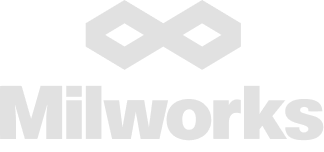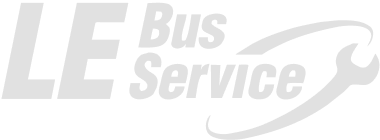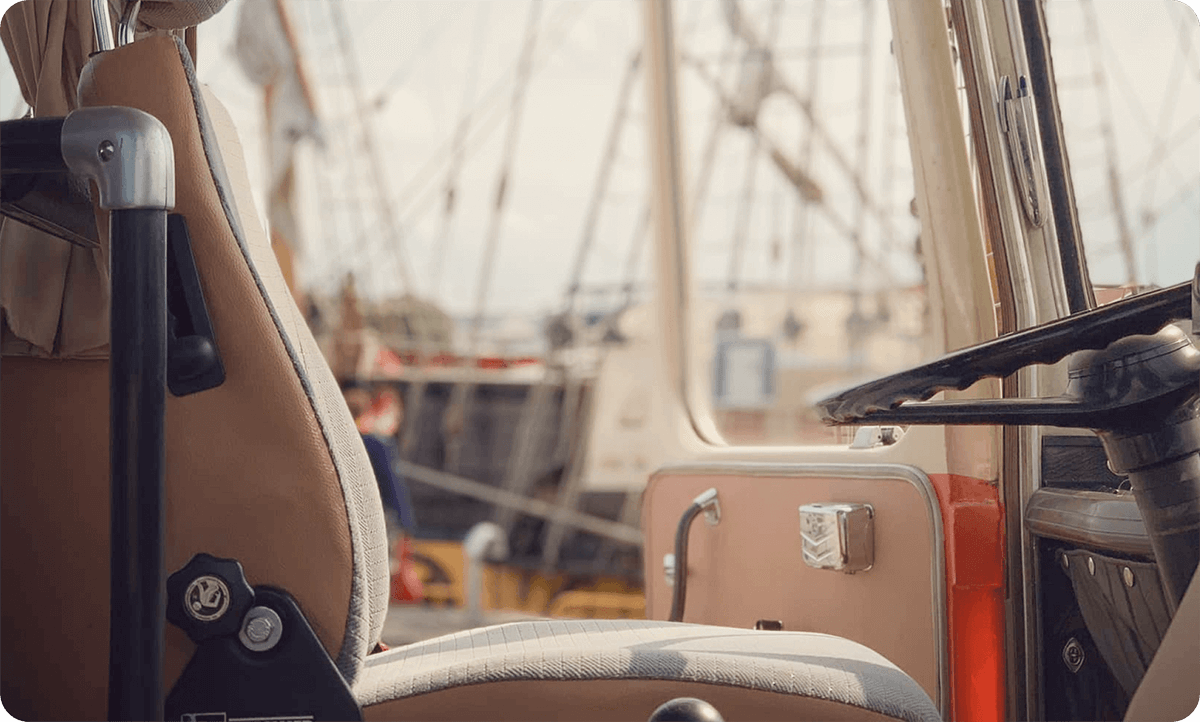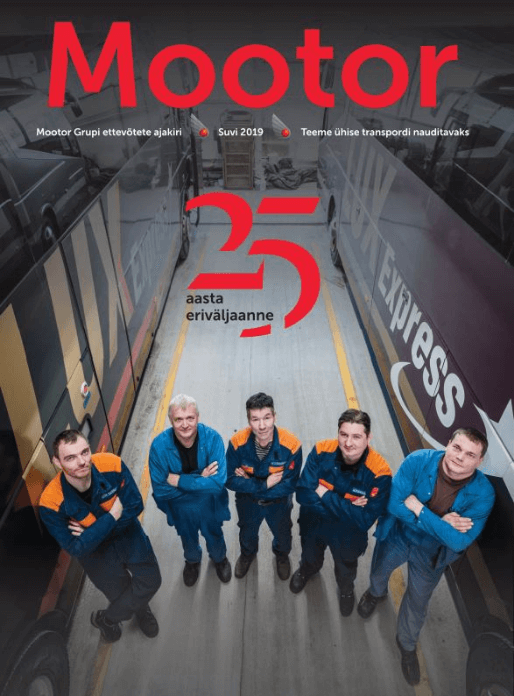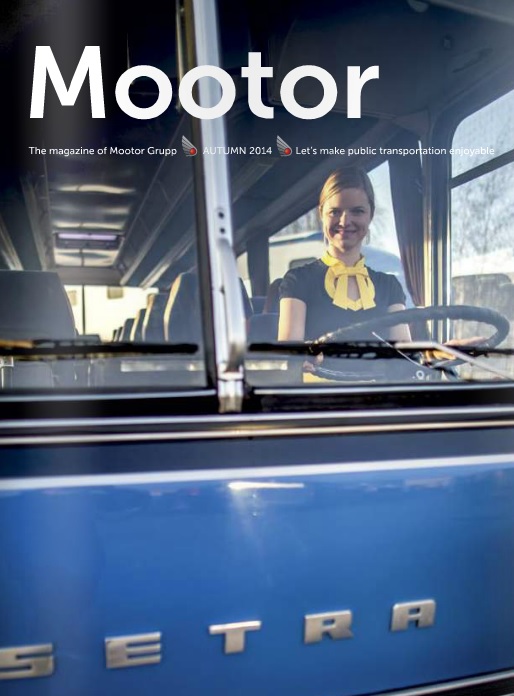In January, SEBE starts operating the Harju County public bus lines in the Eastern direction.
COVID-19 crisis has halted Lux Express international bus traffic by 98% and reduced national bus traffic in Estonia up to 50%.
Turnit wins the Lithuanian passenger train ticket sales system procurement.
By the beginning of the corona crisis in March 2020 the Mootor Grupp companies are in peak shape;
Turnit is developing active cooperation with VY in Norway, Slovaklines, Transdev in France, CTM in Morocco and Bus Eiranig in Ireland. Foot is almost in the door in America and Africa;
Busland has gained trusting relationships in Norway, Sweden and Finland;
Lux Express turnover is 40M on international lines between the Baltic states and St Petersburg and on Estonian national lines;
After winning major procurements, SEBE has started operating the capacious bus segment of Harju County;
Tpilet and Cargobus are esteemed products on the Estonian market with large user numbers;
In 2019, Mootor Grupp is active in four fields in developing the national and international mobility services. SEBE, Lux Express and Lux Charter in passenger transport segment; Turnit, Busland and Milrem LCM (today's Milworks) in technology and machinery segments; T Grupp in creating and developing bus traffic infrastructure; Cargobus in the segment of small parcel and goods carriage.
In July 2019, SEBE starts operating the northern lines in Harju County;
2018 SEBE wins the Harju County northern region bus lines procurement (Maardu), contract price 21 million euros;
2018 June – Lux increases the volume between Tallinn and Tartu – departures at every full and half hour, 62 times a day;
2017 November – New charter service brand Lux Charter is launched;
End of 2017 – Milrem divides into two; Milrem LCM active in repair and maintenance of the Defence Forces’ machinery remains in the group, military industry group Patria is involved as a strategic partner;
2017 June – Lux Express establishes subsidiary LE Bus Service OÜ to provide repair and maintenance for Lux Express buses;
2017 SEBE starts serving Pärnu city lines;
2017 Repair and maintenance workshops are established in Tartu and Pärnu;
2016 November – A unique and never before seen vintage bus exhibition is held at Noblessner;
2016 April – Lux Express brings brand new luxurious Lounge buses to the Tallinn-Tartu line, investing nearly 4 million euros;
2016 Busland forms a mobile team in Scandinavia for conducting large-scale outdoor works at the client’s site;
2016 T solution (current Turnit OÜ) starts cooperating with Transdev and Nettbuss;
2015–2016 Successful competition is provided to the Superbus entering the Estonian market;
2015 Tallinn bus station’s 50th anniversary is celebrated with various events;
2015 In summer Lux Express’s subsidiary activated in Poland; in summer, Lux Express started operating the Polish national bus traffic;
2015 In spring the innovative ticket sales system Jiffi developed by the software development team of T group working in Tartu won Estonian largest business idea competition Ajujaht 2015;
2014 Since fall Milrem has been actively working on an unmanned ground vehicle (UGV) development project that by now has turned into a product which is popular at military trade fairs and highly demanded in the military industry;
2014 August, Eesti Buss OÜ starts operating on national lines under Simple Express brand;
2014 Lux Express AS subsidiaries in Finland and Russia start departing 3 times a day on Saint Petersburg-Helsinki line, new destinations are Moscow and Prague;
2014 Summer, 4 SEBE charter buses spend their first season abroad serving Asian tourists in Norway and Sweden;
2014 May, Mootor Grupp celebrates 20 successful years in business by hosting an international conference and formal reception;
2014 January, train company Elron, owned by the state, starts competing for market share;
2013 November, Lux Express starts operating the SEBE Hourly Express lines from Tallinn to Tartu, Narva and Pärnu; Eesti Buss OÜ, a subsidiary of SEBE, starts operating the long-distance lines;
2013 the turnover of Mootor Grupp reaches 50 million Euros, the company employs nearly 1000 people and several services of public transportation sector are sold from Norway to St Petersburg and Finland to Berlin.2013 SEBE establishes subsidiary Milrem OÜ which starts offering life-cycle management services for Estonian APC's XA180EST and XA188;
2012 Tallinn bus station is renovated;
2012 SEBE and Lux Express introduce the Scania Irizar buses, which provide each passenger with a personal multimedia centre;
2012 The international line network of Lux Express reaches Berlin once again;
2011 Renovation of historic bus ZIS-127 is finished;
2011 Busland starts establishing client base in Sweden and Norway;
2010 Bussireisid OÜ hands the charter services over to AS SEBE and, as the former starts operating Tallinn bus station, the company changes its name to OÜ Tallinn Bus Station;
2010 SEBE wins Tartu city lines procurement and invests 130 million kroons;
2010 Mootorreisi AS (EUROLINES) changes its name to Lux Express AS;
2009 Busland conquers Finnish market with its repair services;
With the purchase of Setra S80, Ikarus Lux and ZIS 127 the collection of timeless buses is started;2008 Lux Express, which later becomes a quality product for international bus traffic, is introduced to the market;
Busland establishes workshops for bus renovation and emergency repairs at the Karla village in Kose rural municipality;
2007–2008 SEBE begins to operate county bus lines in Ida-Viru County and wins bus traffic procurement in Võru County;
2007 Mootor Grupp, company to guide and coordinate the strategic business directions and investments of the companies in the group, is established;2007 SEBE purchases new Bova Magic buses for Tallinn–Tartu line and introduces a new product – The Hourly Express;
2007 based on SEBE workshops, OÜ Busland, offering renovation and repair services for buses, is established;2006–2007 cheap flights services cause the long-distance bus business of EUROLINES to fall through and the line network is cut back, offices in Moscow and Minsk are closed and lines are readjusted for Baltic region;
Difficult times in Estonian bus industry begin, passenger numbers fall, costs rise, private car sales go up;
Renovation and bus repairs services for Finnish bus companies are offered in Võru;
2004 SEBE purchases Võru Autobaas and turns it into Võru department;
2003–2005 Cargobus expands over the Baltic region;
2001–2002 SEBE vs. Taisto battle and general disorder on Estonian bus market;
Golden era of the EUROLINES network connecting the Baltic states and Germany;
International lines are extended to Brussels, Amsterdam, London and Paris;
2000 Bussireisid OÜ, operating ticket sales and charter services, is established;
Companies are launched in Moscow and Minsk, and Moscow–Cologne line is opened;
Mootorreisi AS purchases the bankrupt Tallinn county lines bus station;1999 Cargobus starts selling bus tickets in its terminals and opens a terminal at Pärnu bus station;
1999 SEBE buys from AS Tarbus the long-distance traffic starting from Tartu and within a year becomes the bus company operating the national long– distance bus traffic;
1999 Mootorreisi AS purchases the first double-decker buses (Setra 328 DT) for Germany lines;
asutatakse Eurolines ettevõtted Minskis ja Moskvas;
SEBE operates the Estonian lines with 32 Scania and Volvo buses, the company employs 102 employees;
Successful sales and marketing company UAB Eurolines Baltic International is founded in Lithuania;
1996 workshop on Betooni Street is established;
1996 AS SEBE takes over the long-distance traffic beginning from Narva;
1996 EUROLINES brand is introduced on the international lines and pan-European line network is joined;
After obtaining the Kaunas bus station, the bus traffic between the Baltic states and Germany is logistically connected to form a whole;
1995 Cargobus opens terminals in Jõhvi and Narva which function as bus stations along side with offering parcel service;
SIA Baltijas Autobusu Linijas, a company established in Riga, opens Riga-Berlin-Munich and Riga-Berlin-Hamburg lines;
SEBE tõuseb Eesti-siseste ekspress bussiliinide liidriks;1994 – 1996 Mootorreisi AS and its subsidiaries in Tallinn, Riga and Vilnius begin to operate bus traffic between Estonia, Latvia, Lithuania and Germany;
Hugo Osula ja Toivo leht koos sõpradega lahkusid Taani ärimeeste kätte läinud Mootorist ja alustasid oma ettevõtlusega. Usalduslikud suhted Soome bussiettevõtjatega, partnerlust pakkuv Hansapank, suurepärane bussiala kompetents ja palju odava hinnaga kasutatud busse Euroopa turul andsid võimaluse agressiivseks reisijateveo äri arendamiseks.
In 1989, Ülemiste branch separated from Tallinna Autobussikoondis and became an independent company. The executives of the company did not ponder long and named the new company Mootor. RAS Mootor made it trough the difficult times, but in 1994 it was handed over to Danish businessmen who gloriously renamed the company to Eesti Buss and went bankrupt shortly after.
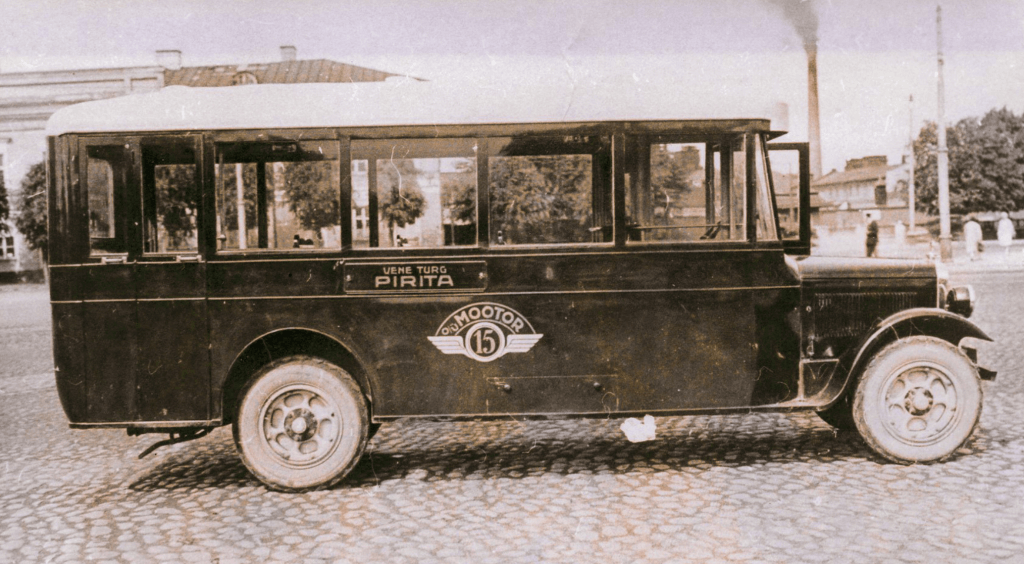
The name Mootor (meaning 'motor') has been used as a name for bus company since 1926, when bus enthusiasts of that time joined their assets and equipment and so established OÜ Mootor, transportation and passenger transport company of the Republic of Estonia. This company became the flagship of Estonian bus traffic, operating bus lines, constructing buses and owning shares in the rapidly evolving air traffic.













